Services
Mini Implants
The problem: loose dentures or partials 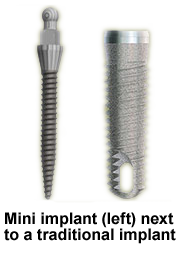
Mini-implants are a recently developed implant system designed to provide denture stability for people who have no (or very few) teeth remaining. They were developed by IMTEC Corporation and were awarded FDA approval in 1999. Mini implants differ from traditional implants in two ways. As you may guess from their name, they are much smaller than traditional implants. Mini implants are also single piece implants; they do not have a screw hole into which other components can be attached. The portion of the implant which sticks out of the gums is shaped like a little ball, which snaps into a retaining socket on the inside of a denture. When several of these mini implants are used underneath a denture, the result is a very stable denture which does not move around, pop out, or require any type of adhesive to keep it in place. The denture still rests on the gum tissue, but the mini implants keep it from moving from side to side and up and down.
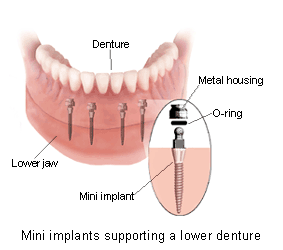
Due to their smaller size, mini implants can be used in areas where there is not enough bone for traditional implants. Because mini implants are less expensive to place than traditional implants, and we can usually modify an existing denture to work with the mini implants, using them is a more affordable option to stabilize dentures in cases where cost is a factor. A disadvantage to the mini implants is that the denture cannot be trimmed down like it can when we use traditional implants. Being that mini implants require the denture to be supported by the gums, the upper denture still must cover the roof of the mouth and the lower denture still has to extend to the floor of the mouth. Many denture wearers dislike the way an upper denture covers the entire palate so for them, a denture supported by traditional implants may be a better choice.
Mini implants can only be used under a denture or a partial, they are simply too small to support crowns or bridges. If a patient is considering replacing their mini implant supported denture or partial with crowns and bridges sometime in the future, then traditional implants should be used instead since they can be used with both removable dentures and non-removable implant bridges and crowns.
How many mini implants do you need to support a denture?
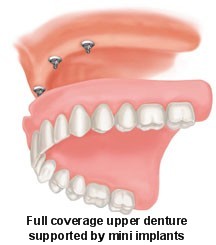
Generally speaking, more mini implants mean a more stable denture. Four mini implants are the minimum for the lower denture, and six mini implants are the minimum for the upper denture. We prefer to place as many as possible depending on how much bone we have to work with, but in most cases ten mini implants is the most we can place in the top or bottom arch.
If you are wearing dentures and would like them be more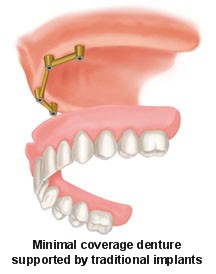 stable, then mini implants are probably a good option for you. On the other hand, if you really dislike the way dentures feel and want to eliminate the plastic covering the roof of your mouth, then traditional implants are a better choice.
stable, then mini implants are probably a good option for you. On the other hand, if you really dislike the way dentures feel and want to eliminate the plastic covering the roof of your mouth, then traditional implants are a better choice.
What about mini implants for people wearing partial dentures?
Mini implants are also great for stabilizing partial dentures. They are placed in the areas where the teeth are missing and snap into the bottom of the partial. A better option is to replace the missing teeth with traditional implants and get rid of the partial denture altogether, but the mini implant stabilization method is a quick and cost effective way of stabilizing partial dentures.
Doesn’t it hurt?
Absolutely not. The process of having mini implants placed is much easier and less traumatic to a person than having a tooth removed. Mini implants can be placed in 45 minutes or less, and the procedure done here in our office under local anesthetic. There is no need whatsoever to be sedated for this procedure, although we do have nitrous oxide (laughing gas) and/or oral sedatives for people who are really anxious. The bone into which the mini implants are placed does not have any sensory nerve endings in it, so the surgery has very little post-operative discomfort. We place mini implant patients on antibiotics for a few days before and after the surgery to ensure that the mini implants do not get infected before the bone has a chance to heal around them. We offer a free panoramic x-ray and exam for anyone interested in mini implants.
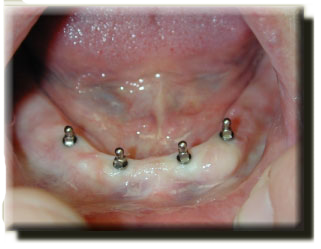
For more information on dental implants please click here.
Six Month Braces
Autauga Station Dental is proud to offer six month braces, using the Powerprox technique.
For information about six month braces click here, or call our office.





